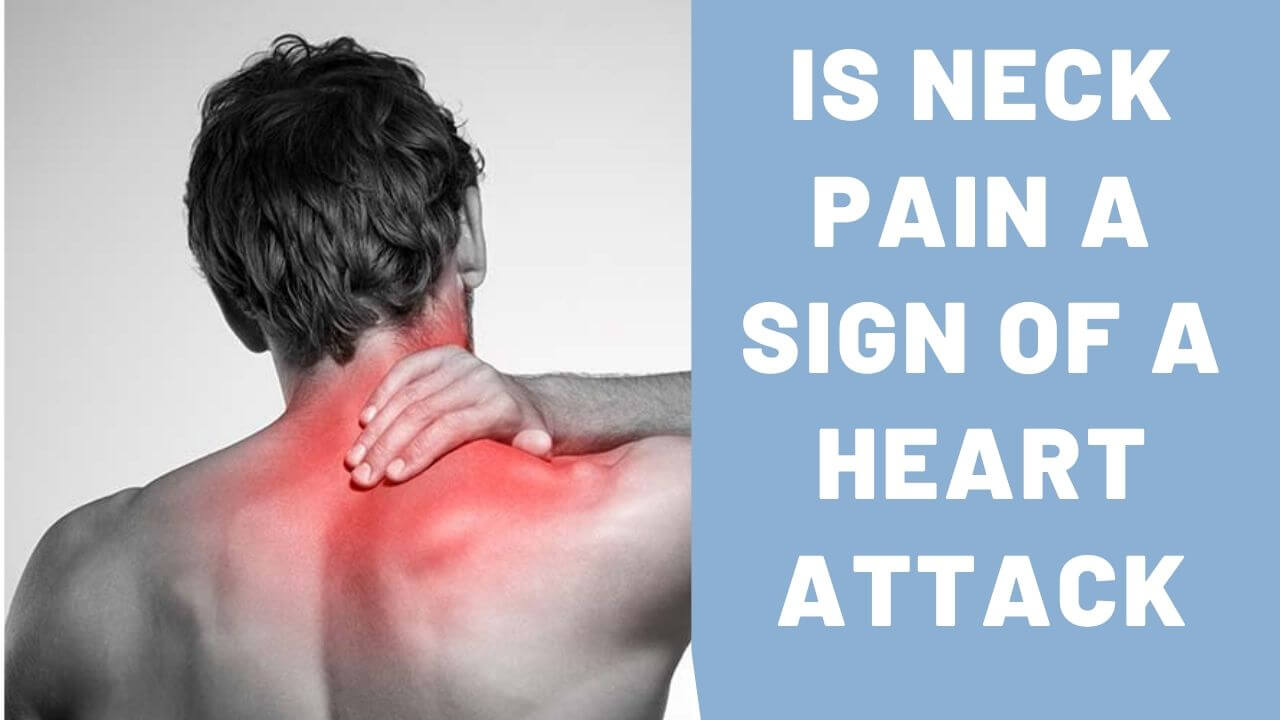Research and Evidence based article is taken from the study by Dr. Marshall Emig MD
In this article, Is Neck Pain a Sign of a Heart Attack: A Comprehensive Guide we are going to discuss heart attack, signs that will say you’re having a heart attack, symptoms of having a mild or massive heart attack, states during a heart attack in different body parts. What is the current medication to a heart patient and what should you do if you think you’re having a heart attack?
Then we will talk about neck pain, what causes neck pain, what are the risk factors of neck pain and the things about neck pain that is might be related to a heart attack.

According to NCBI and Jospt, at any given time 70%-75% of the population will experience neck pain in their lives. [1][2]
It is so strange to think that, up to 1 in 5 individuals are experiencing neck pain right now, with 54% of people having had neck pain in the last 6 months.
In the US, neck pain ranks 2nd in annual workers’ compensation costs. In Sweden, the numbers are even more telling- 18% of all disability payments are for neck and shoulder related problems. [2]
According to jospt.org research, 5% of neck pain sufferers will become disabled as a result, unable to work or function normally as a result. [2]
Women consistently report more neck pain than men, especially musculoskeletal pain. 30% of patients who have neck pain will develop chronic symptoms.
According to the American Medical Association | AMA low back and neck pain rank 3rd in total healthcare costs in the US annually, coming in at a staggering $86 billion dollars.
In the US, chiropractors are estimated to treat over 35 million patients annually. Neck pain ranks as the 2nd most common reason for all chiropractic visits after back pain, comprising 24% of all visits. source
Just over 20% of U.S. adults had arthritic conditions (22.1%) or lower back pain (20.3%). A smaller percentage of persons reported having non-arthritic joint pains or other joint conditions (17.5%) and neck pain or problems (14.3%), and an even smaller percentage had sciatica (9.8%). Source: by TC Clarke – Cited by 15 – Related articles
Our neck, also called the cervical spine, supports the full weight of your head, which is on average about 12 pounds (5.44kg). Surprisingly, another strange fact is that, when the neck is bent forward, the weight on the cervical spine can be as much as 60 pounds, depending on the degree at which the neck is tilted.
While the neck being one of the most important parts of your body, you may don’t give it that much importance as it requires! Well, not until something goes terribly wrong with it!
Although a random pain in your neck or a little soreness doesn’t refer to a serious medical issue, you should know the rare exceptions where you may go through a Cervical artery dissection.
As the neck carries our heaviest and most important body part, Head and it also connects the heart and the brain, It can play a major role or contain a symptom during a heart attack. In this article, we are going to discuss heart attack and the things about neck pain that is might be related to it.

Neck pain usually attacks due to neck muscle fatigue and strain. But sometimes neck pain is a sign of a heart attack. Neck pain occurred due to poor posture during sleep, sitting in a position for too long, etc. If neck pain is more than muscle fatigue and strain then it might be due to heart disease
How common is a heart attack at 35? Can a 35 year old have a heart attack?
Nausea, cold sweat, shortness of breath, indigestion dizziness, fatigue, heartburn or abdominal pain are the silent signs of a heart attack. Sometimes, tightness, pain, or a squeezing, feeling pressure on neck, jaw or back can occur at any time.
Research has shown that the rate of heart attack in the U.S. has declined in recent decades among 35– to 75-year-olds.
Coronary heart disease (CHD) is the most common type of heart disease, killing over 370,000 people annually. Every year about 735,000 Americans have a heart attack. Of these, 525,000 are a first heart attack and 210,000 happen in people who have already had a heart attack. Source
When you are having these signs and symptoms, don’t overlook and pay attention to them. See a heart specialist if possible:
When you are getting a mild or mini heart attack, these symptoms may occur. Be quick to respond if you confront any of these:
Source: American Heart Association
Too much decrease in your blood pressure or too much increase in it can be a major sign of a heart attack or a stroke! Hypotension (low blood pressure) is an often seen symptom of a severe heart attack. It happens because the artery is completely or partially blocked and your heart cannot pump enough blood due to that or some tissue damage. If the blood pressure doesn’t decrease all of a sudden, it might just act normal in most cases. But for some people, it might even increase! It’s actually Hypertension.
If you have a consistent Hypertension Stage 1 (Blood pressure consistently ranges from 130-139 systolic or 80-89 mm Hg diastolic), it means you are having a risk of possible heart attack or stroke. But if you are facing a Hypertension crisis where your blood pressure readings suddenly exceed 180/120 mm Hg and it continues for more than 5 minutes, and you experience any controlling problem on any organ like shortness of breath, difficulty in speaking or change in vision, Be sure to Call 911 and reach out for an ambulance. Source: American Heart Association
If you are a woman and having these symptoms in your body, Beware of a heart problem.

“Although men and women can experience chest pressure that feels like an elephant sitting across the chest, women can experience a heart attack without chest pressure, Instead they may experience shortness of breath, pressure or pain in the lower chest or upper abdomen, dizziness, lightheadedness or fainting, upper back pressure or extreme fatigue,” said Nieca Goldberg, an American Heart Association volunteer and M.D., medical director for the Joan H. Tisch Center for Women’s Health at NYU’s Langone Medical Center.
Source: American Heart Association
There are three types of a heart attack:
Source: Healthline.com
There are different diagnosis types and different treatments for different types of attacks.
But, to give you a quick grasp, the most common heart attack treatments are:
Source: American Heart Association
When you are having a heart attack and a severe pain in your arm (Left arm most of the time), Some specific feelings will come up. You will get an arm pain all of a sudden and the pain will rise to intense level within just a few minutes. Heavy pressure on the arteries in the arm is felt. Along with that, your fingers will try to squeeze in and you won’t have much control over it. This happens because the heart cannot pump the blood appropriately.
Neck pain is a state of the neck when the neck muscles are strained or any other parts like the ligaments, bones are treated unusually like a long bad posture can cause inflammation or injury to your neck. A good example is when you’ve fallen from above, hitting your upper torso when the Cervical disks absorb shock between the bones. And all these are not really that much serious medical issue and usually relieved in a few days.
But when it comes to heart disease discussion, Neck pain is referred to when Getting a tear to a major blood vessel in the neck. It leads you to a potential heart attack.
There are a lot of reasons that can cause neck pain. Some of them are harmless, some are the absolute opposite, deadly. I’ll consider mentioning the less harmful once first.
These are commonly seen symptoms of neck pain:
Although neck pain is a common physical distress at the young stage of life, Studies have been done due to the importance of identifying risk factors among young adults to possibly prevent oversaturated neck pain later in their life.
Source of the study: BMC Public Health
As a result, 33% of them reported persistent neck pain from 46% of the participants who reported the onset of neck pain at an early stage of the study. And they also reported that the reason for the onset and persistent neck pain caused by a computer screen not positioned appropriately and the posture for sitting in front of the computer wasn’t ideal.
Although a normal neck pain caused by a minor hit or a bad posture doesn’t really call you to serious medical attention. But, If Cervical artery dissection takes place and it stays for more than a few minutes, be sure to call 911. There are some potential complications of serious neck pain.
During a heart attack, you will most likely be feeling very uncomfortable irritation on the neck muscles and they will try to squeeze in. High pressure on the upper spine, cramping is often-seen signs of neck discomfort or pain during a heart attack.
“Often patients, particularly women, will experience pain in the shoulder, arms, neck, and jaw, or between the shoulder blades, While it may seem like a pain in these areas is not related to the heart, it actually is quite common,” said Robert Rogers, MSN, ACNP-BC.
Source: Norton Healthcare
The 4 main and major signs of an impending heart attack are:
Source: Penn Medicine
Yes. It can lead to headaches or problems with your vision, the vision can be blurred or you can face focusing difficulty.
Is a chest pain always refers to heart disease: NO.
Right side chest pain is related to a heart problem: YES
People suffering from anxiety disorders can suffer from chest pain: YES
Chest pain can be caused by Stress: YES
A heart attack happens with sudden chest pain: NO
Before a heart attack, there will be shortness of breath, cold sweat, fatigue, vomiting, etc: YES
If you have chest pain and other signs of a heart attack, Call 911 right away.
When a cervical artery dissection occurs, there is a chance for you to go into a stroke. Although the statistics say there are only 2 in 100,000 people who confront this situation. But the chance is still there and increasing! “Over the past two decades, awareness of cervical artery dissection has grown tremendously,” says Dr. Natalia Rost, associate professor of neurology at Harvard-affiliated Massachusetts General Hospital.
Source: Harvard Medical School
The major arteries in your neck supply blood, oxygen, and nutrients between your brain and heart. When the arteries hurt, most of the time it’s because of a clog in a major artery there. If it hurts too much for more than a few minutes, it’s maybe because the heart cannot function and work with the brain which can lead you to a stroke.
If you are getting neck pain that lasts for more than a few minutes, it’s better for you to see a cardiac doctor as soon as possible. Because, one of the reasons why neck pain takes place, is a clog in the heart so it cannot pump enough blood to the brain that can lead to a stroke.
Although usual neck pain isn’t always there as a sign of cancer, continuous and persistent neck pain can be a sign of neck or head cancer. There will be bumps and lumps around the neck and head. Other signs you may face are continuous throat and facial pain, numbness on the head and neck, Swelling and pain in the jaw or chin area.
When you are having pain on the left side of your neck, there are many possible causes to that Such as A regular Inflammation, Muscle strain or fatigue, Ripped nerve, Fibromyalgia, Or Heart attack!
https://www.nebraskamed.com/heart/heart-attack-quiz
https://www.aarp.org/health/conditions-treatments/info-10-2012/heart-attack-quiz.html#quest1
https://www.webmd.com/a-to-z-guides/prevention-15/heart-healthy/rm-quiz-heart-myths
The bottom line is, If you are suffering from neck pain, that doesn’t just mean that you have heart disease, It might even be caused by last night’s sleep when you were laying on your neck without giving it a proper support! or some other cause like anything may have gone rough to the neck can cause neck pain as well. Don’t panic if that’s the case.
But if you are suffering from neck pain for a long time and didn’t have a little reason like I mentioned above, be sure to see a cardiac doctor who can suggest to you what it is or what should you do. You can call 911 and seek assistance as well. Best wishes for your happy life!
The research was taken from Dr. Marshall Emig, MD
Read More:
Warning Signs of a Heart Attack – American Heart Association
Heart Attack Neck Pain | Heart Attack Warning Signs
Women: Don’t Ignore These 3 Subtle Heart Attack Symptoms
Could Neck, Jaw or Back Pain Signal a Heart Attack?
Heart attack symptoms and signs | The Heart Foundation
When a pain in the neck is serious – Harvard Health
11 Possible Heart Symptoms You Shouldn’t Ignore – WebMD
 |
 |
 |
 |